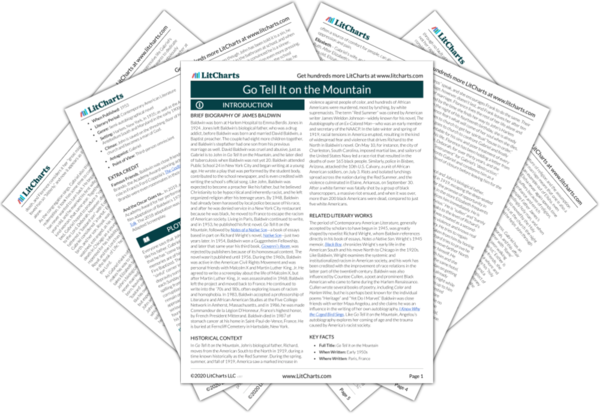Rachel Quotes in Go Tell It on the Mountain
She had always seemed to Florence the oldest woman in the world, for she often spoke of Florence and Gabriel as the children of her old age, and she had been born, innumerable years ago, during slavery, on a plantation in another state. On this plantation she had grown up as one of the field workers, for she was very tall and strong; and by and by she had married and raised children, all of whom had been taken from her, one by sickness and two by auction; and one, whom she had not been allowed to call her own, had been raised in the master’s house.
Gabriel was the apple of his mother’s eye. […] With the birth of Gabriel, which occurred when [Florence] was five, her future was swallowed up. There was only one future in that house, and it was Gabriel’s—to which, since Gabriel was a manchild, all else must be sacrificed. Her mother did not, indeed, think of it as sacrifice, but as logic: Florence was a girl, and would by and by be married, and have children of her own, and all the duties of a woman; and this being so, her life in the cabin was the best possible preparation for her future life. But Gabriel was a man; he would go out one day into the world to do a man’s work, and he needed, therefore, meat, when there was any in the house, and clothes, whenever clothes could be bought, and the strong indulgence of his womenfolk, so that he would know how to be with women when he had a wife.
For he desired in his soul, with fear and trembling, all the glories that his mother prayed he should find. Yes, he wanted power—he wanted to know himself to be the Lord’s anointed, His well-beloved, and worthy, nearly, of that snow-white dove which had been sent down from Heaven to testify that Jesus was the Son of God. He wanted to be master, to speak with that authority which could only come from God.

Rachel Quotes in Go Tell It on the Mountain
She had always seemed to Florence the oldest woman in the world, for she often spoke of Florence and Gabriel as the children of her old age, and she had been born, innumerable years ago, during slavery, on a plantation in another state. On this plantation she had grown up as one of the field workers, for she was very tall and strong; and by and by she had married and raised children, all of whom had been taken from her, one by sickness and two by auction; and one, whom she had not been allowed to call her own, had been raised in the master’s house.
Gabriel was the apple of his mother’s eye. […] With the birth of Gabriel, which occurred when [Florence] was five, her future was swallowed up. There was only one future in that house, and it was Gabriel’s—to which, since Gabriel was a manchild, all else must be sacrificed. Her mother did not, indeed, think of it as sacrifice, but as logic: Florence was a girl, and would by and by be married, and have children of her own, and all the duties of a woman; and this being so, her life in the cabin was the best possible preparation for her future life. But Gabriel was a man; he would go out one day into the world to do a man’s work, and he needed, therefore, meat, when there was any in the house, and clothes, whenever clothes could be bought, and the strong indulgence of his womenfolk, so that he would know how to be with women when he had a wife.
For he desired in his soul, with fear and trembling, all the glories that his mother prayed he should find. Yes, he wanted power—he wanted to know himself to be the Lord’s anointed, His well-beloved, and worthy, nearly, of that snow-white dove which had been sent down from Heaven to testify that Jesus was the Son of God. He wanted to be master, to speak with that authority which could only come from God.











